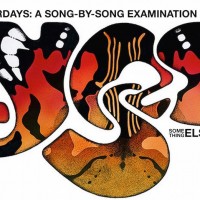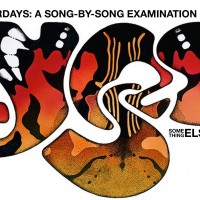Part of the reason Yes’ 1971 album Fragile is a hallmark in the world of progressive rock is the production of Eddie Offord.
The album was initially envisioned as a double album of original compositions for the entire band, and Yes gave serious consideration to recording it in America using an outside producer. Perhaps as fortune would have it, Yes was under strict time and budgetary constraints, having to record the album in about a month in Advision Studios in London. Offord was able to make the not-so-easy pieces composed for the album seemingly fit together.
The results were strong. However, there were no songs that were written by the entire band. Four of the songs on Fragile make my Top 20 favorite Yes song of all time. Unfortunately, “Cans and Brahms” – the Rick Wakeman arrangement of the third movement of Symphony No. 4 in E minor by Johannes Brahms – makes my list of my least favorite songs by the world’s greatest progressive rock band.
Granted, it’s hard to imagine Tony Kaye employing electric piano, electric harpsichord and a Moog synthesizer to produce the orchestral sounds Rick Wakeman crafts on tracks like “Can and Brahms.” Still, Wakeman’s individual piece seems more like a minute and a half of filler.
Wakeman has claimed over the years that he was unable to provide Yes any original compositions due to his solo record deal and publishing. That, if true, is unfortunate. As it stands, Yes’ Fragile is a great album which could have been even greater with a Rick Wakeman original.




Not a standout track but a small piece in the brilliant puzzle that is Fragile.
This album was always way less than the sum of its parts and this track is probably the poster child for that. You had 20 minutes of top-tier stuff for the genre, another ten of really good songs. And about seven minutes of obvious filler that just stops all momentum that the album has going in its tracks and this is pretty emblematic of that and they are all the solo tracks that weren’t The Fish. (I’ll give Mood for a Day a partial pass. It is probably too long for what it is but if it were placed somewhere else on the album, maybe right after Roundabout, it probably would have actually worked.)
It is kind of bizarre because there are plenty of albums out there that have more than seven minutes of filler that still “work.” But for some reason, for me anyway, I have a hard time listening to this as an album. They might have been better off doing a seven minute ambient instrumental improv to get the album up to 40 minutes.
Anyway, this album always infuriates me because so much of it is so good, but I just can’t sit down and listen to it as an album.
Nice piece but not unforgettable.
the track or this “article”?!?!
Rick’s assessment of the track was “dreadful” but it was indeed for contractual reasons, although your Yes history is a bit off here.
First, the original plan for Fragile was a second LP that consisted of a live version of “It’s Love” and their recording (also probably live, but some reports indicate the studio version) of “America.” Whether there would be other material to fill out the second LP has never really been verified as these two tracks would only account for a little over 20 minutes. OK for a bonus record, but not really enough for the second half of a double album. I suspect that the idea was never really fully developed due to the reported time and finance constraints on the album that relegated it to a single album and was also apparently part of the reason for the solo tracks such as this.
More importantly, Rick did contribute material for Fragile. His contract prevented him for receiving credit, but they couldn’t really prevent him from actually doing so. The middle section of “South Side of the Sky” and a significant portion of “Heart of the Sunrise” are the most obvious Wakeman contributions, which he has confirmed in interviews over the years. He also further contributed to the overall sound of Yes with helping to develop their expertise in arrangements, particularly the concepts of recapitulation and variations on a theme as heard in “Heart.” Even at the beginning unique arrangements was a Yes trademark (particularly in covers like “Something’s Coming” and “America” but Rick’s classical background added a sophistication to their approach which was arguably a big piece of the puzzle for the more complex music to come on “Close to the Edge” and beyond.
Rick originally intended to use a piece he wrote called “Handle with Care” which became the basis for “Catherine of Aragorn” on his “Six Wives of Henry VIII.” It’s not clear whether this track was just renamed or changed musically for the eventual release, but it features Bill, Chris and Steve, like all of the other “solo” tracks on Fragile aside from “Mood for a Day.” Steve having a solo acoustic piece not only had a precedent on “The Yes Album” but the composition was already being performed as part of his solo spot in concert in the middle of “Clap.”
There are other musicians on the released version of “Catherine”, including singers so my suspicion is that the recording for “Fragile” was not completed, and Rick simply added the additional parts to what Yes had already recorded.
Rick used the piece extensively as part of his solo spot on the “Fragile” and “Close to the Edge” tours, and “Fragile” takes on more of a Yes feel if you replace “Cans” with “Catherine.”
Nice perspective, Thanks. Wakeman has offered different accounts over the years, This seems plausible. Thanks for the feedback.